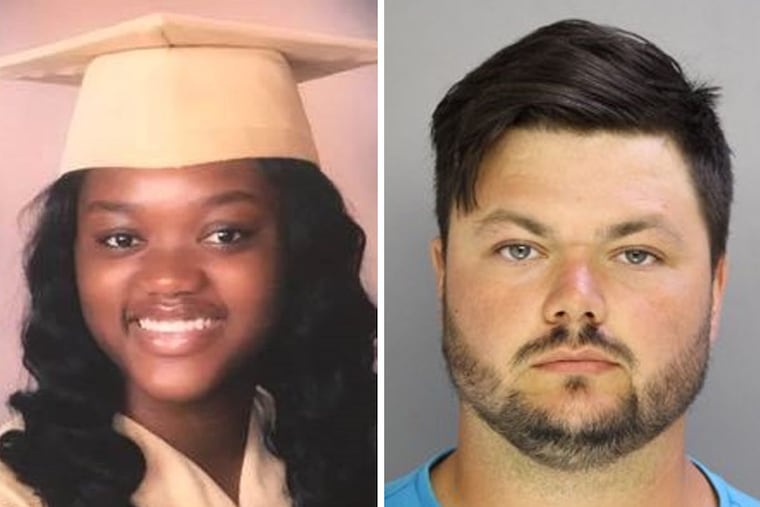This road rage verdict delivers justice for Bianca Roberson, but it leaves us baffled | Maria Panaritis
We do not know today, any more than we did 18 months ago, the answer to the one question that gripped us all after the indelible instant that left a promising young woman dead in her car on southbound Route 100 in West Goshen Township: Why?

The prison sentence was harsh: Up to 40 years on third-degree murder for pointing a Smith & Wesson out the window of a truck and killing an 18-year-old woman who was behind the wheel of a Chevy Malibu.
And yet, even this sledgehammer of justice against David Desper for the murder of Bianca Roberson has left many of us feeling empty. Baffled, still, over a case that gripped the nation in the summer of 2017.
We do not know today, any more than we did 18 months ago, the answer to the question that vexed us all after the indelible instant that left a promising young woman dead in her car on southbound Route 100 in West Goshen Township.
The question: Why?
Why did a man with no criminal record — a man whose lawyer and prosecutors both found to be living a nonviolent life — fire a loaded weapon at an 18-year-old as the pair of motorists came upon each other on a stretch of high-speed road where two lanes narrow into one?
One reason we know so little is that there was no trial. Also, no sworn account from the defendant. Desper refused to give investigators a statement after turning himself in and eventually pleading guilty to third-degree murder.
I sought answers this week by calling lawyers on both sides. This was, as I vividly recall from being a reporter on the story in June 2017, a case as chilling as they come.
The killing and the days-long manhunt made national news. There was racial discontent in the air across the country — a tinderbox of anger and polarization following the inauguration of President Trump months earlier. The shooting happened just weeks before the violent white supremacist rally in Charlottesville, Va.
Roberson was an African American teen whose parents had moved to the suburbs from West Philadelphia. They thought this would keep her safe. And it did — until then. She was a highly regarded graduate of Bayard Rustin High School and college bound. She was shot in the head by a bullet from Desper’s gun.
Desper, we learned in trickles after his arrest, was a white graduate of Chichester High School who had recently become a union machinist. He still slept amid plastic stars and Camaro posters in the bedroom of his childhood home in Trainer, a Delaware River borough near impoverished Chester City.
Desper turned himself in soon after investigators released photos of his red truck. Because he refused to give a statement, detectives went to work trying to find motive in other ways. They wanted to know if race had played into the decision to fire the gun he had legally purchased in 2015 — a weapon he kept on the console of his truck while driving.
“We tore apart his life, basically,” District Attorney Tom Hogan told me this week. “I told my guys, ‘I need you to scrub up everything you can on this guy, because if this is racially motivated, we need to know.’
"They went back and re-created his day. Everyone he was working with that day. They went through his friends, his contacts, all of them, to find out what they knew about him. They go back through his high school history, through his traffic violation history, through absolutely everything they can that’s linked to him.”
What they found: No history of mental health problems. No accounts of a man with a rage-control issue. He also owned a semi-automatic AR-15 rifle, a second handgun, and he stored in his room targets that he brought home from shooting practice, Hogan said.
“A typical blue-collar guy," Hogan said, "who liked guns and not much else.”
Detectives talked to his coworkers and his friends, looking for any racial animus. “Did not find any,” Hogan said.
Desper’s attorney, Dan McGarrigle, has been reluctant to speak publicly about the case. He shook his head in court as Judge Ann Marie Wheatcraft rejected his request for a lighter sentence during a Dec. 13 sentencing hearing that brought just about everyone to tears. The judge also rebuked Desper for claiming he had been frightened when he shot at Roberson.
McGarrigle took my call but would only say publicly one thing: That his client had never shown himself to be an angry man prone to such violence.
“The commonwealth investigated my client thoroughly,” McGarrigle said. “His friends, family and coworkers. The person that they were told about was the same person in the 80-plus character letters provided to the court at sentencing, who all, almost to a T, described him as a kind and gentle person.”
All we know for sure: That person took Bianca Roberson’s life. And perhaps all we need to know is that it was made possible by the gun on his console.